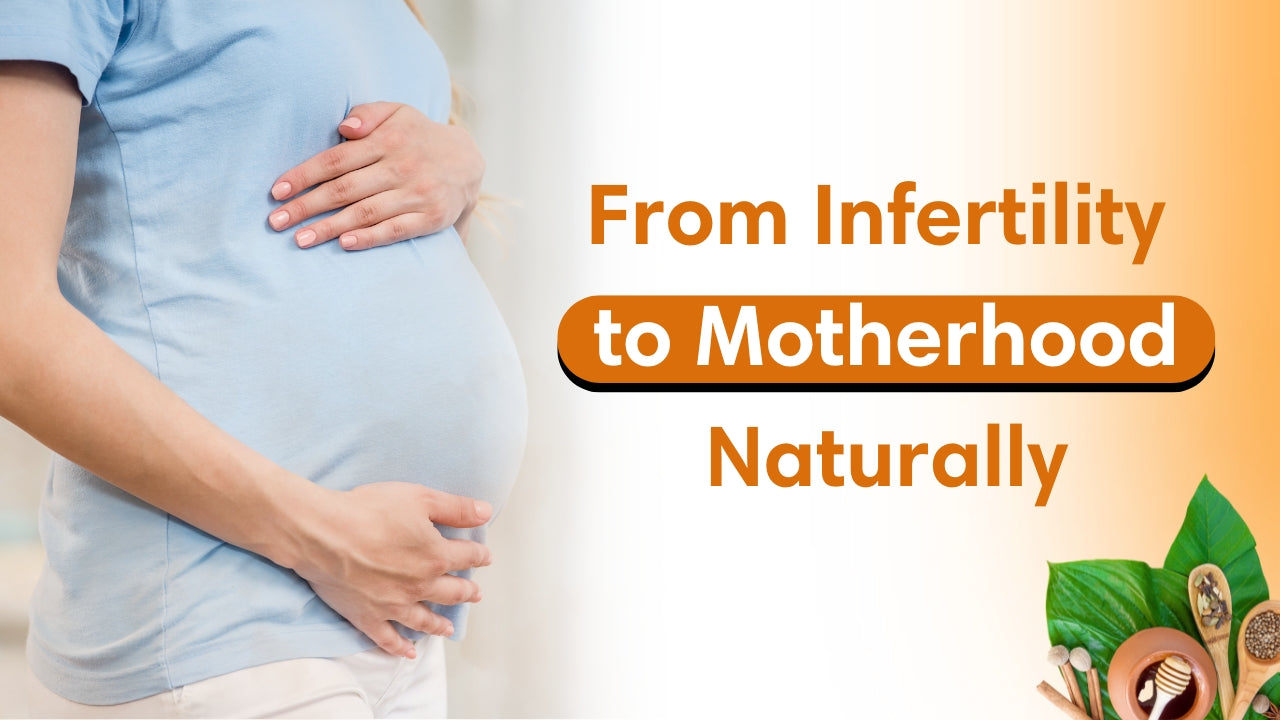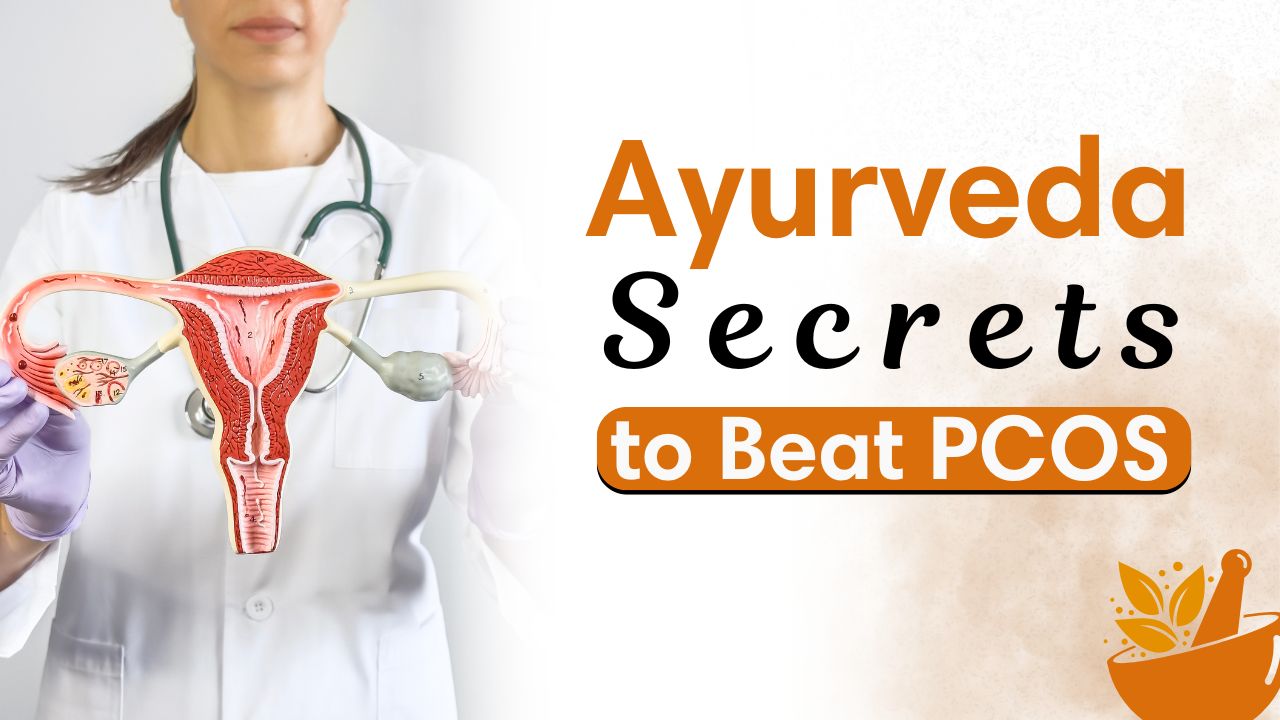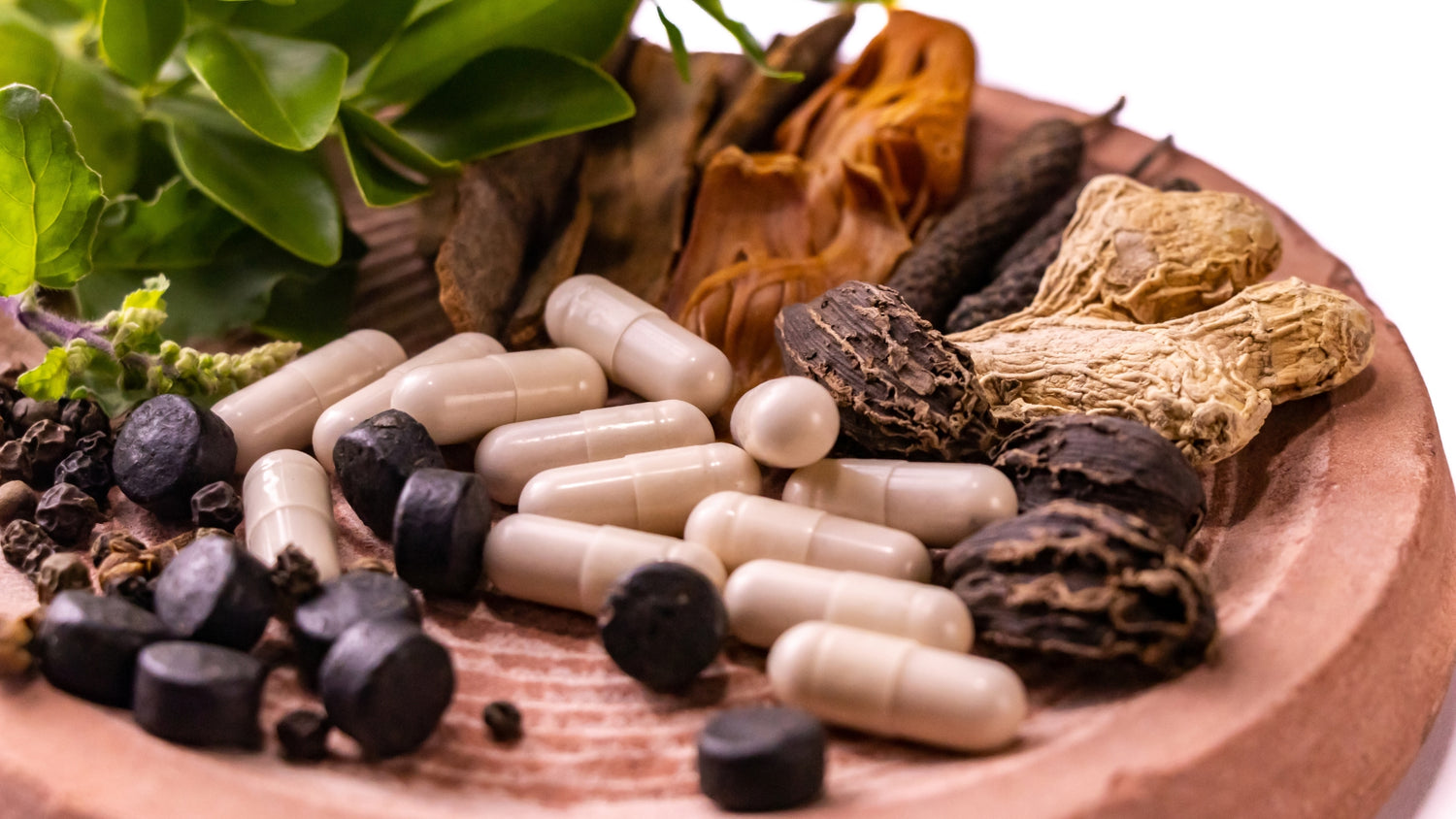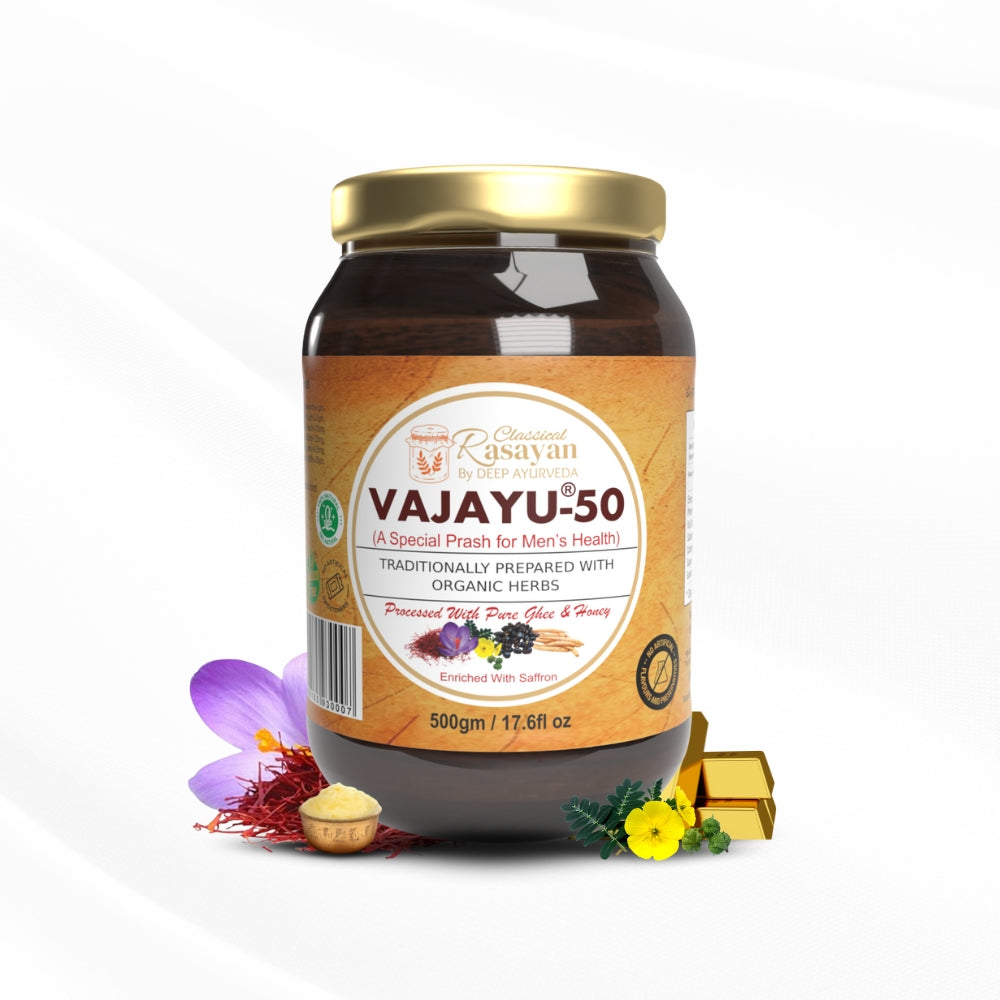News
Female Infertility: A Holistic Ayurvedic Journey to Motherhood
The WHO (World Health Organization) that approximately 1 in 6 people globally experience infertility in their lifetime. Infertility rates generally increase with age, especially in women, where the quality and quantity of eggs decline with age. Infertility or Bandhyatva Infertility is defined as the inability to conceive a pregnancy after 12 months of regular, unprotected intercourse. It can be primary (if the woman has never conceived) or secondary (if she has conceived before but is now unable to conceive). In Ayurveda, infertility is referred to as Vandhyatva (वन्ध्यत्व). It is defined as: "आर्तवदोषाद् वा योनिदोषाद् वा गर्भाशयावरणाद् वा न गर्भं धारयति सा वन्ध्या।" चरक संहिता, चिकित्सा स्थान ३०/२०) A woman is called Vandhya (infertile) if she is unable to conceive due to: Vitiation of Artava (menstrual blood or ovum) Disorders of the Yoni (reproductive tract) Obstruction in the Garbhashaya (uterus) Causes of Infertility in Females- Hormonal Imbalance Low egg quality or small size follicles Polycystic Ovary Syndrome (PCOS) Uterine Fibroids Tubal Blockage Low AMH Level Lifestyle Factors like Stress, smoking, alcohol, excessive exercise,Obesity or being underweight,Nutritional deficiencies Bandhyatva Nidan- According to Ayurveda, successful conception (Garbhasambhava) requires the proper functioning of four factors: Ritu (Fertile period) Kshetra (Healthy uterus) Ambu (Proper nutrition or rasa dhatu) Beeja (Healthy ovum and sperm Other causes- Dosha Imbalance(mainly pitt dosh vitiliation causes bandhyatva) artav vah strotodusthi(menstrual cycle disturbance) Ahar-Viharaja Factors (Diet and Lifestyle) Manasika Nidana (Psychological Factors) Types of Vandhyatva (Infertility) in Ayurveda "सप्तधा वन्ध्या प्रोक्ता दोषतो गर्भनाशनात्। पुंसो दुष्टात् स्त्रियाश्चैव गर्भाशयापवर्तनात्॥ स्राविणी च क्षतार्तव्या पुष्यन्ती चापि रक्तिनी। एता वन्ध्या भवत्येव सप्तधा नात्र संशयः॥"— हरित संहिता, स्त्रीरोगाधिकार, अध्याय 2 Dosaja Bandhya-due to imbalance of doshas Stridusta-due to any disorder in female reproductive system, Garbhasayapavrttta-due to misplaced uterus from its position for eg in uterine prolapse Garbhanasaja- due to recurrent miscarriages Pumsodusta- due to male sperm deformities Sravini- Heavy or prolonged bleeding (menorrhagia type infertility)। Ksataatavya- when body Fails to nourish the embryo after conception, leading to early miscarriage or infertility. Modern Techniques for Female Infertility Ovulation Induction- Stimulate ovulation in women who do not ovulate regularly or at all. Intrauterine Insemination (IUI)-processed (washed) sperm is injected into the uterus during ovulation. In Vitro Fertilization (IVF)-Eggs are retrieved from the ovaries and fertilized in the lab. The resulting embryo is then transferred into the uterus.7. 4)Surrogacy-Embryo is created using the intended parents’ or donors’ gametes and implanted into a surrogate mother. Holistic Ayurvedic Approach to Female Infertility Ayurveda not only treats Infertility it also enhance fertile health of a female through beej suddhi hence not only infertile couples but a normal couple without any cause of infertility planning for baby should go for beej suddhi for a better progeny. Ayurveda adopts a comprehensive treatment plan involving herbal medicines, Panchakarma therapies, diet corrections, yoga, and stress management. 1)Sodhan Chikitsa- Detoxification treatments help remove deep-rooted toxins (ama) and restore reproductive health: Vamana (Therapeutic emesis) – Removes excess Kaph .In condition like PCOD, Obesity, tubal blockage vaman plays a significant role. Virechana (Therapeutic purgation) –.Vitiation of pitt dosh is a main causative factor for Infertility in maximum females and also causes recurrent Miscarriages in many females as due to excessive heat garbhasya is unable to hold the fetus..Virechan plays a significant role in such condition by balancing the excessive pitt from body. Nasya(administration of medicated oil through nose)-Nasya stimulates the hypothalamus-pituitary-ovarian (HPO) axis by acting through the nasal-brain connection. This can regulate menstrual cycles, ovulation, and hormonal imbalances. Raktmokshan-blood detoxification should be done by sirabhed raktmokshan procedure where 30 40 ml blood letting is done .In females with excessive pitt in their body are at a risk of infertility so by performing raktmokshan the excessive heat in blood is removed through this procedure. Basti (Medicated enema) – Especially effective in Vata-related infertility,where Vitiation of apan vayu rajavahastrotodushti. Shirodhara- is a classical Ayurvedic therapy where a continuous stream of medicated oil, decoction, or milk is gently poured over the forehead .It plays a powerful supportive role in infertility treatment, especially when the cause is linked to Stress and anxiety, Hormonal imbalance Uttar Basti: A Powerful Ayurvedic Therapy for Uterine Health “बस्तिश्चोत्तरो यः स्यात् स्त्रीपुंसोर्भववर्जितः।”— Charaka Samhita, Siddhi Sthana Uttar Basti refers to the administration of medicated oil or decoction into the uterus (female) or urinary bladder/urethra (male) via the vaginal or urethral route Uttar basti through vaginal route is administered for the nourishment of endometrial lining of uterus. Indications of Uttar Basti in Females Bandhyatva (Infertility) Garbhasrava / Garbhapata (Recurrent miscarriages) Cervical erosion Uterine fibroids (as supportive care) Tubal blockage Procedure of Uttar Basti- Purva Karma (Pre-Procedure):Snehan (oleation) and Swedan (fomentation) of lower abdomen,Bowel and bladder should be emptiedPradhana Karma (Main Procedure):Medicated oil (2-3 ml)(phalghrit) is introduced into the vaginal canal or uterine cavity using a sterile catheter/syringe ,Usually done in the post-menstrual phase (after 5th–6th day)Pashchat Karma (Post-care):Rest for a few hours,Avoid cold, intercourse, and heavy work on the day of procedure Benefits of Uttar Basti in Women: Improves uterine tone and endometrial healthClears tubal blockages (mild) and Uterine fibroids.Enhances fertility and implantation Tubal Blockage and Uttar Basti - Tubal blockage refers to the obstruction in the fallopian tubes, which prevents the ovum from reaching the uterus or the sperm from reaching the ovum, leading to Infertility. In Modern Science Laparoscopic Surgery (Tubal Recanalization), Salpingostomy or Fimbrioplasty, Hysteroscopic Tubal Cannulation are some procedures done for tubal blockage. But through Ayurveda tubal blockage can be treated without any surgical procedures and side effects .Uttar Basti of Kshar kashish oil is done in tubal blockage ,and some lekhan aushad like triphala guggul ,is given in such patients for removal of blocakge in tubes. 2) Shaman Chikitsa- Charaka has classified 50 Mahakashayas (great decoction groups), and Garbhasthapan Mahakashaya is one among them, which promotes conception and uterine nourishment. Sanskrit Name Botanical Name Key Action 1. Shatavari Asparagus racemosus Uterine tonic, balances hormones 2. Ashoka Saraca indica Controls bleeding, strengthens endometrium 3. Lodhra Symplocos racemosa Astringent, balances Pitta-Kapha 4. Gokshura Tribulus terrestris Supports reproductive hormones 5. Bala Sida cordifolia Nourishes uterus and dhatus 6. Mustaka Cyperus rotundus Digestive, reduces toxins 7. Yashtimadhu Glycyrrhiza glabra Anti-inflammatory, endocrine regulator 8. Vidarikand Pueraria tuberosa Strengthens reproductive system 9. Kusha Desmostachya bipinnata Sacred, used in fertility rituals 10. Durva Cynodon dactylon Uterine tonic, stops excessive bleeding Classical medication for garbhadharan- Phala Ghrita Pushpadhanwa ras(for increasing egg quality and for ovulation and in cases of low AMH) Shatavri ghrit Kalyanak ghrit Dashmoolarishta Rajahpravartani vati Supari Pak Conclusion Ayurveda views infertility not as a disease but as a symptom of internal imbalance. Through a combination of detoxification, herbal treatment, lifestyle modification, and mind-body healing, Ayurveda offers a natural, safe, and holistic path to overcome infertility. With personalized treatment and patience, Ayurveda enhances not just fertility, but overall reproductive and emotional wellness.
Read moreNews
PMS (Premenstrual Syndrome): Causes, Symptoms, and Ayurvedic Herbs
Premenstrual Syndrome (PMS) affects millions of women worldwide, causing mood swings, bloating, fatigue, and more. This blog explores the Ayurvedic view of PMS, its causes, symptoms, and natural remedies using powerful herbs like Ashoka, Shatavari, and Lodhra to restore hormonal balance and promote well-being.
Read moreAyurvedic Treatment for PCOS: What Actually Works?
Polycystic Ovary Syndrome (PCOS) is more than a hormonal disorder—it reflects deep internal imbalances. Ayurveda offers a holistic path to healing PCOS by correcting digestion, balancing doshas, and rejuvenating the reproductive system naturally. Discover powerful Ayurvedic herbs, daily lifestyle tips, and the natural way to regain hormonal harmony.
Read moreHow Ayurvedic Supplements Help Women Improve Their Health and Wellness
Ayurveda claims to offer many benefits for women’s health, either internally or externally, depending on the specific herb and its intended purpose. But as a woman, if you are looking for ayurvedic or the best adaptogen supplements, then NariPanch is the best option you can consider for yourself.
Read more




